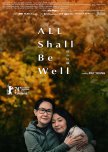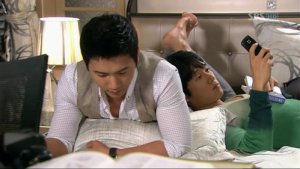
needed to be expanded into a miniseries, or else rewritten into a tighter narrative.
This film is extremely pretty to look at - and I'm not just referring to the rugby thighs of actor Chu Meng-hsuan! But amazing visuals are just about all the film did for me. So I cannot recommend it, unfortunately. Below, I will discuss the major formal aspects in the same order that I started noticing them while watching the film:Filming: amazing!! and very, very red.
The cinematography is stylish and gorgeous here. Lighting and colors are dramatic in a way that reminds me of Mag Hsu's 2018 Taiwanese film "Dear Ex" (btw, if you were thinking of watching "The Time of Huannan" but haven't seen "Dear Ex" yet, go watch "Dear Ex" right this second! it's such a good film.). Shot composition is occasionally stunning, especially when neon lights are involved.
Soundtrack: ugh.
The musical soundtrack is way too busy, in a way that reminds me of some Asian drama series. I recognize that busy soundtracks are really a matter of personal taste, and to be fair the film does embrace silence in some sections - I just wish it leaned into that more! Anyways, with everything going on in it, the soundtrack also never actually manages to build a substantial contribution to the mood of the film. This is at least partly because of the specific song choices (which I felt were really mismatched to the film, but perhaps that's also a matter of personal taste): the musical styles of the songs are so different that they don't stand together, because nothing else in the film ties them together. It felt like the director couldn't figure out how to tell a story using music, and he also couldn't figure out how to select music to match the visual+emotional journey of the film. As a result of these problems, the soundtrack was a very annoying and intrusive experience for me.
Narrative: uh-oh...
The film has a number of narrative problems because the director/writers tried to squeeze too many stories and threads into the film. For example, one of the queer characters discloses being sexually assaulted, and then that emotional bomb is totally ignored for the rest of the film; such trivial treatment of that topic makes it feel like the film is (hopefully unintentionally) doing a spectacle of queer pain from the perspective of the heterosexual protagonist - a spectacle which is even more one-note than the harshness of Liu Kuang-hui's 2020 Taiwanese film "Your Name Engraved Herein". Because the narrative tries to do too many things with its four main leads, the characterization ends up rather shallow and flimsy. Even though the film is already on the longer end for conventional cinema, with a runtime of 2.25 hours, there just wasn't enough time to develop the characters enough to make me connect with them before the story tried to get an emotional payoff. For most of the film I felt very little sense of interiority in the characters, and not enough understanding of who the characters were to help me empathize with their motivations for their behaviors. The film ends by indulging in melodramatic sentimentality (complete with flashback montages in the style of mass-market Asian dramas) which felt cloying to me because the necessary emotional weight was not properly established beforehand in the characterization, and because of all the plot contrivances made to justify the ending.
Editing: meh.
The problem with this film is that its pacing is driven by a flawed narrative. Unfortunately, the pacing holds back the high-level composition of the film: different scenes are edited together in a way that never really works for me. The result didn't give me a sense of cinematic rhythm comparable to the rhythm of different shots within each scene, and I didn't really feel a sense of temporal coherence. Because of this, the film felt more like a dream of free-association jumps between different moments than the continuous narrative demanded by the plot; this wouldn't have been a bad thing if the film had been constructed specifically for such a structure (e.g. if the time travel had been via dreaming rather than a handwaved science-fictional mechanism). Alternatively, this wouldn't have been a thing at all if the film had instead been constructed as an episodic miniseries.
Missed opportunity 1: a miniseries.
Imagine if the story had been given more room to breathe as a drama series. Then we could've spent time with each character to learn about their background, their hopes and dreams, their worries and struggles. And flashbacks would have actually felt temporally significant. These are all strengths of the 2023 k-drama "Twinkling Watermelon" - and its story also happens to be a "young adult travels back in time and learns about his father as a young adult and encounters barriers to changing history" plot with an ensemble of four main characters. So maybe you should watch that series instead of this film.
Missed opportunity 2: a tighter film.
Or imagine if the story had been simplified in the direction of minimalism. Then we could've spent much more time with the striking cinematography, lingering on gorgeous and thoughtfully-designed shots as the actors traveled through time and space. If we slowed down pacing all the way into the extreme of slow cinema, then the director could even have deleted all the songs from the soundtrack and come out with a better film. A big part of the artistic quality of the slow-cinema films of Taiwanese director Tsai Ming-liang - which only have the absolute minimum bare bones of a plot - is that they give their shots plenty of room to breathe in order to reshape our experience of time; the striking visuals drive the pacing of those films, in the process showing us deeper truths about the characters. Tsai makes films with powerful imagery instead of strong storytelling, because of what he's good at (e.g. he said, "The storyline might be plain, but it is meant to carry the power of imagery, so as to reveal the essence of cinema. [...] I never thought of myself to be a good storyteller. Therefore, I chose to be otherwise.", in a talk which has been translated at the Senses of Cinema blog); "The Time of Huannan"'s director could probably have made this film good with powerful imagery, instead of trying and failing to tell a good story. But even stopping far short of slow cinema by keeping a more textured story could've yielded a truly great film - perhaps something like "Dear Ex", which has a more relatable, complex, and emotionally moving narrative than "The Time of Huannan" (and also one about a guy learning more about his father! go watch "Dear Ex" instead of this film!) while also being significantly shorter.
Conclusion: a hollow apple.
Because the film lacks a solid core to drive its visual polish, it's like what Scott McCloud describes in his book "Understanding Comics" as a hollow apple: art which has a shiny surface but is empty inside.
Vond je deze recentie nuttig?

Deze recentie kan spoilers bevatten
with in-laws like these, who needs enemies?
This quietly brutal film depicts a violence of memory/remembering - a violence of erasure, of withholding, of rewriting history and truth - enacted against queer people by their family members once those queer people are silenced by factors beyond their control. It unflinchingly shows how family members betray the two lesbian women in their lives after the death of the one who is their biological relative. They do this by ignoring her wishes, by betraying her grieving widow (their in-law), by insulting the widow's dignity, by undermining the widow's belonging in the family, and by betraying any sense of proper relations among kin - all in order to take the wealth left behind by their deceased relative. The film helps us to understand the motivations for each character's choices against a history of class differences and the oppressive backdrop of Hong Kong's material scarcity for basic needs. We are shown how a lack of institutional and societal recognition of queer relationships creates the opportunity for shameful behavior between family: in a deeply unequal society organized around capitalism (alluded to throughout the film, but most explicitly in the mention of how the deceased woman had managed to rise from being a factory worker to a factory owner; and also looming in the background of the housing crisis hanging over everyone in the film), these extended family members see no way to pursue a decent life other than by turning against their queer kin.The disgracefulness of this so-called "family" is shown in how they apologetically disrespect the two queer women who had previously helped them financially (at least to some limited extent), specifically by kicking the surviving partner out of the apartment she had shared with her deceased partner. They justify this choice as a way to give her nephew his own exclusive place to raise a new baby. Heterofuturity (here as a privileging of the heterosexual continuity of future generations against queer people still alive in the present) manifests in the way that the extended family assumes that the only reasonable way they can benefit from their deceased kin's estate is by asserting their exclusive control over her apartment; they aren't even able to imagine or propose any compromises in which they might share the apartment with their lesbian in-law by living in the apartment together and taking care of each other. In this way, they foreclose any possibility of keeping this queer family member in their lives, much less any possibility of growing closer to her after the loss of this person who had been such an important presence in all of their lives. If (to quote a remark made by the queer couple when they shared a particularly expensive whiskey with their extended family in the film's prologue) "sharing with family isn't wasting", then the extended family lays waste to their kinship relations with their lesbian in-law, by taking the apartment from her and then refusing to share it with her.
Ultimately the film ends with a bitter sense of exasperated acceptance, and perhaps of resignation: with no options available under the legal system for staying in her apartment, the widow has capitulated to the demands of her deceased partner's extended family. She makes this decision after getting written confirmation of the truth of her partner's intentions (which had been to leave everything to her) after even that was questioned by one of her in-laws. The widow's lesbian friends (which is her and her former partner's found family in multiple ways) step in as replacements in order to carry out the familial rites and responsibilities to her deceased partner, responsibilities which had been so coldly abandoned by her deceased partner's biological kin: I am especially talking about the burial-at-sea of flower petals as a symbolic way of fulfilling the deceased's wishes which had been overruled by the extended family. We end with a scene remembering how much meaning the deceased woman had found in her queer family as an adult, after a childhood of hollow and sometimes even violent biological kinship. This scene bookends all the ways the film has shown us the biological/extended family using their traditional values to rationalize their understandable - yet utterly shameful - behavior, underscoring the film's critique of heterosexist ways of doing "family".
This film evoked a complicated mix of emotions in me. Through much of the film I felt anger at the unjust way the family treated their grieving lesbian in-law. And in the ending scene it transformed into a heavy sadness, in my recognition of an aspect of my own difficult experiences with family with the ending scene's reflection on finding meaning in the concept of "family".
Vond je deze recentie nuttig?


 1
1





















